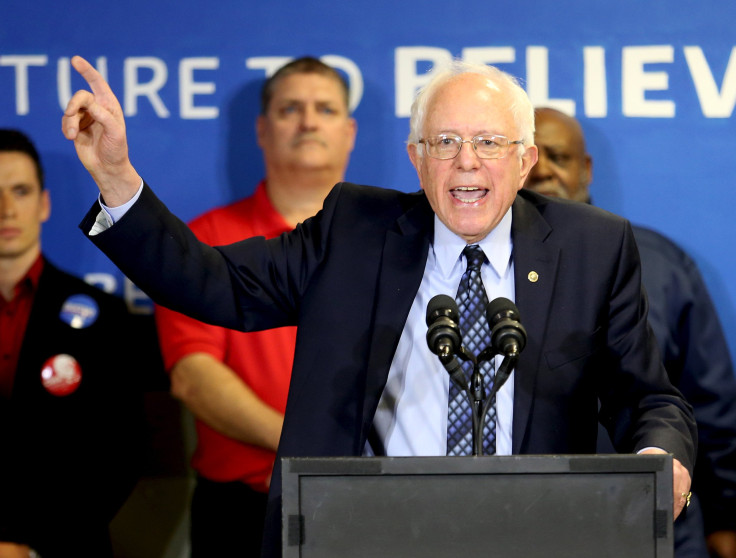Super Saturday 2016 Results: Bernie Sanders Lags Behind Hillary Clinton In Delegate Count As Democrats Head To Michigan

Bernie Sanders had a good Saturday night, pulling out two wins from the Democrats’ three nominating contests, but it is unlikely to help him catch up to Hillary Clinton, who ahead of Saturday, held a bigger lead in the delegate count than President Barack Obama's widest margin in the 2008 Democratic primary.
With Democrats voting in Louisiana and caucusing in Nebraska and Kansas, Sanders won both the Midwestern states while Clinton carried Louisiana. These results mirrored the candidates' previous wins, as caucuses typically favor more ideological members of a party’s base, playing to Sanders’ strength among more liberal Democrats.
Both Nebraska and Kansas have fairly white electorates, an advantage for Sanders. Clinton is much more popular than Sanders among voters of color, having beat him by wide margins in South Carolina and in the several Southern states that voted on Super Tuesday. In Louisiana, where African-Americans make up 32 percent of the population, the former secretary of state won more than 70 percent of the vote Saturday, while Sanders took about 68 percent of the vote in Kansas, which is 86 percent white, and 55 percent of the vote Nebraska, which is 89 percent white.
Voter turnout was high in Kansas Saturday, according to the state's Democratic party. Sanders has said that he does well when voter turnout is high, and he has appealed to many first-time voters this year.
This turnout is INCREDIBLE https://t.co/jPhavIixdy
— KansasDems (@KansasDems) March 5, 2016
“I thank the people of Kansas for their strong support," Sanders said in a statement Saturday. “People used to ask, ‘What’s the matter with Kansas?’ It turns out that there’s nothing the matter with Kansas when you give people a clear choice and involve them in the democratic process."
“We have now won double-digit victories from New England to the Rocky Mountains to the Great Plains to the Midwest. Democrats in Kansas today added to a column of double-digit victories in Minnesota, Colorado, Oklahoma, New Hampshire and Vermont," the statement continued. "We also came from behind and ended up in virtual ties in Iowa and Massachusetts. We have the momentum. We have a path toward victory. Our campaign is just getting started and we are going all the way to the Democratic National Convention in Philadelphia."
Clinton spoke in Michigan after Saturday's results were announced, where she congratulated Sanders on his wins but focused her remarks on Republicans and on the people of Michigan.
"The Republicans like to divide us," she said. "You are proving when we work together, we can rise together."
Unlike the contests in early-voting states last month, there was little polling in the “Super Saturday” states ahead of Saturday night. The two polls conducted in Louisiana this year showed Clinton leading Sanders 60.5 percent to 21.5 percent, consistent with her other victories in Southern primaries, but polls were too scarce in Nebraska and Kansas for political analysts to make many predictions there. A Clinton aide told CNN Saturday that her campaign expected to take home more delegates even if Sanders won Nebraska and Kansas. “He will win states, we will rack up delegates,” the aide said.
Clinton’s campaign on Saturday also sent a memo to reporters emphasizing the delegate count and their candidate’s lead in that area. “Clinton’s lead in delegates exceeds President Obama’s highest margin during the 2008 primary and is a significant step in the fight for the Democratic nomination,” the memo said.
Going into the weekend’s nominating contests, Clinton had 1,066 delegates to Sanders’ 432, but the former secretary of state’s large lead came from her outsized share of superdelegates. Because those delegates are unpledged and can change their mind if they see momentum moving another way, she was likely hoping to solidify her lead over the Vermont senator before the two move on to states with more delegates later this month.
The next big round of voting will take place Tuesday, when voters in Michigan and Mississippi will cast their ballots. Then, Florida, Illinois, Missouri, North Carolina and Ohio will hold primaries March 15, and 792 delegates will be awarded.
While Clinton has clearly turned her attention away from Sanders and toward the general election — and the Republican front-runner Donald Trump — in recent days, the Sanders campaign has said it will stay in the race and plans to be competitive in those big-delegate states. Both Democrats have spent time in Michigan over the past week, courting voters in the heavily industrial state by talking about ways to bring jobs back to the United States and help the middle class.
I have opposed disastrous trade agreements which have led to the loss of millions of decent-paying jobs.
— Bernie Sanders (@BernieSanders) March 5, 2016
Clinton unveiled a jobs plan in Detroit Friday, while Sanders has repeatedly criticized her for previously supporting trade deals such as the North American Free Trade Agreement, which he said helped companies move American jobs overseas to countries with lower wages. While Clinton has won endorsements from the majority of national labor unions, Sanders has significant support among rank-and-file union members, and those voters could help him do well in states like Michigan and Ohio.
The two Democratic candidates will face off in Flint, Michigan, for a debate Sunday. Both Clinton and Sanders have spoken about the need to help Flint, which is largely African-American, recover from its water crisis, and the debate is expected to be a chance for them to show their understanding of issues facing black voters. Clinton often shines in debates, but this matchup will be a crucial moment for Sanders. He has said he expects to do better among black voters outside the South, and that theory will be tested when Democrats vote in Michigan this week.
© Copyright IBTimes 2025. All rights reserved.






















